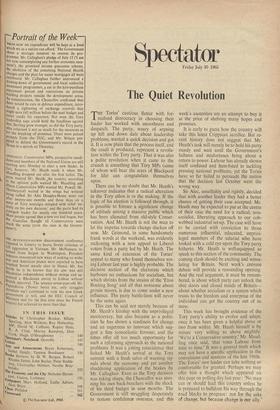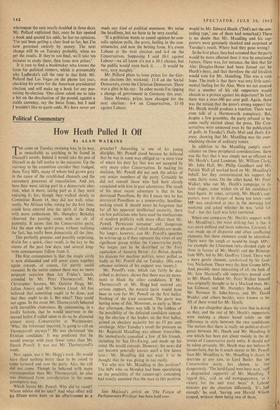The Quiet Revolution
THE Tories' cautious flutter with for- malised democracy in choosing their leader has' worked with smoothness and despatch. The party, weary of arguing up hill and down dale about leadership problems, wanted a quick decision and got it. It is now plain that the process itself, and the result it produced, represent a revolu- tion within the Tory party..That it was also a, polite revolution when it came to the crunch is something that Tory MPs (some of whom will bear the scars of Blackpool for life) can congratulate themselves upon.
There can be no doubt that Mr. Heath's takeover indicates that a radical alteration in the Tory ethos is in the making. If the logic of his election is followed through, it is possible to foresee a significant change of attitude among a massive public which has been alienated from old-style Conser- vatism. And Mr. Heath is not the man to let the impetus towards change slacken off now. Mr. Grimond, in some handsomely frank words at the weekend, was evidently reckoning with a new appeal to' Liberal voters from a party led by Mr. Heath. The same kind of extension of the Tories' appeal to many who found themselves vot- ing Labour last year is highly probable. The decisive section of the electorate which harbours no enthusiasm for socialism, but which shrinks from the strains of the 'Eton Boating Song' and all that nonsense about grouse moors, is due to come under a new influence. The party battle-lines will never be the same again.
This can be said not merely because of Mr. Heath's kinship with the unprivileged meritocracy, but also because as a politi- cian he has shown a readiness for change and an eagerness to innovate which sug- gest a fine iconoclastic fervour; and the tithes offer all too much opportunity for such a reforming approach to the national problems. It was a Jolting coincidence that linked Mr. Heath's arrival at the Tory summit with a fresh salvo of warning sig- nals about the economy and yet another shuddering application of the brakes by Mr. Callaghan. Even as the Tory decision was taking shape, the Chancellor was stun- ning his own back-benchers with the shock of his third budget in nine months. The Government is still struggling desperately to restore confidence overseas, and this week's austerities are an attempt to buy it at the price of shelving many hopes and promises.
It is early to guess how the country will take this latest Crippsian sacrifice. But re- cent history does not suggest that Mr. Heath's task will merely be to hold his party steady and wait until the Government's failures and misfortunes bring about a return to power. Labour has already shown itself confused and ham-fisted in tackling pressing national problems, yet the Tories have so far failed to persuade the nation that the decision last October went the wrong way.
Sir Alec, unselfishly and rightly, decided that with another leader they had a better chance of getting their case accepted. Mr. Heath may be expected to put at the centre of their case the need for a radical, non- socialist, liberating approach to our cob- webbed industrial set-up. The case will have to be carried with conviction to those numerous influential, educated, unprivi- leged members of the salariat who have looked with a cold eye upon the Tory party hitherto. Mr. Heath is well-equipped to speak to this section of the community. The coming clash should be exciting and stimu- lating for Britain. Next week's censure debate will provide a resounding opening. And the real argument, it must be remem- bered, is about which party can unlock the shut doors and closed minds of Britain— about whether socialism or a system which trusts to the freedom and enterprise of the individual can get the country out of its mess. • This week has brought evidence of the Tory party's ability to evolve and adapt, once it has been given a helpful shove or two from within. Mr. Heath himself is by nature very willing to shove mightily. 'We're a Conservative coUntry,' Mr. Maud- ling once said, 'that voles Labour from time to time.' It was a general truth which may not have a specific application in the convulsions and tensions of the late 1960s. The Tories' new leader can take nothing so comfortable for granted. Perhaps we may offer him a thought which appeared on this page on polling day last year : 'No man can or should lead this country unless he is prepared to bulldoze his way through the road blocks to progress: not for the sake of change, but because change is our ally.'
whereupon the sum nearly doubled in three days. Mr. Pollard explained that, once he has opened a book and quoted his odds, he has no opinions. 'I've not been getting a clear lead so far, but I'm now governed entirely by money. The next change will be on Tuesday probably, when we get the results. If they're not final, we'll take ten minutes to study them, then issue new prices.'
It is rare to find a bookmaker who knows the form for political runners, which is presumably why Ladbroke's call the tune in that field. Mr. Pollard had Las Vegas on the phone last year, checking his prices for the American presidential election, and will make up a book for any pro- mising by-election. 'One client asked me to take a bet on the devaluation of the pound, against a stable currency, say the Swiss franc, but I said I wouldn't like to quote odds. We have never yet made any kind of political statement. We value the headlines, but we have to be very careful.
`If a politician wants to sound opinion he con- sults opinion polls, the press, feeling in the con- stituencies, and now, the betting form. It's evens Labour at the next election and 6-4 on the Conservatives. Supposing I said 10-1 against Labour—we all know it's not a 10-1 chance, but the public would soon back it. . . . It would be very, very naughty.'
Mr. Pollard plans to issue prices for the Ger- man elections this weekend: 11-8 on the Social• Democrats, evens the Christian Democrats. There was a glint in his eye: 'In other words I'm tipping a change of government in Germany this year.'
Since Monday, prices have changed for the next election: 6-4 on Conservatives, 11-10 against Labour.





























 Previous page
Previous page